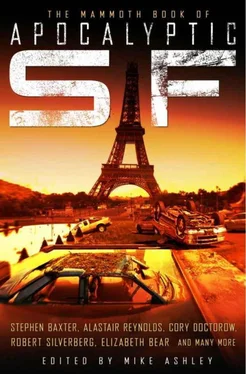And there had been time for much more dramatic evolutionary shifts, time for whole phyla to be remodelled. The squirming multiple organism that fled from Cale’s approach was a descendant of the siphonophores, colonial creatures of the sea like Portuguese men o’ war. Endlessly adaptable, hugely ecologically inventive, since colonizing the land these compound creatures had occupied fresh water, the ground, the branches of the grass-trees, even the air.
Cale sensed something of the transient strangeness of what he saw. Antarctica, empty of humans, had been the stage for Earth’s final gesture of evolutionary inventiveness. But relentless tectonic drift had at last brought Antarctica within reach of the ocean-going communities who sailed over the flooded remnants of India, and the great experiment was about to end. Cale gazed around, eyes wide, longing to discover more.
A coral-tipped spear shot past his head, and he heard a roar. He staggered back, shocked.
A patch of green ahead of him split and swarmed away, and a huge form emerged. Grey-skinned, supported on two narrow forelegs and a powerful articulated tail, this monster seemed to be all head. A spear stuck out from its neck. The product of another transformed phylum, this was a chon-drichthyan, a distant relation of a shark. The beast opened a mouth like a cavern, and blood-soaked breath blasted over Cale.
Lia was at Cale’s side. “Come on.” She hooked an arm under his shoulders and dragged him away.
Back on the beach, munching on snake meat, Cale soon got over his shock. Everybody made a fuss of him as he told his tales of giant wasps and the huge land-shark. At that moment he could not imagine ever returning to the nightmares of the forest.
But of course he would. And in little more than a thousand years his descendants, having burned their way across Antarctica, accompanied by their hunting snakes and their newly domesticated attack-wasps, would hunt down the very last of the land-sharks, and string its teeth around their necks.
Tura and Bel, sister and brother, grew up in a world of flatness, on a shoreline between an endless ocean and a land like a tabletop. But in the distance there were mountains, pale cones turned purple by the ruddy mist. As long as she could remember Tura had been fascinated by the mountains. She longed to walk to them — even, she fantasized, to climb them.
But how could she ever reach them? Her people lived at the coast, feeding on the soft-fleshed descendants of neotenous crabs. The land was a plain of red sand, littered with gleaming salt flats, where nothing could live. The mountains were forever out of reach.
Then, in Tura’s eleventh year, the land turned unexpectedly green.
The ageing world was still capable of volcanic tantrums. One such episode, the eruption of a vast basaltic flood, had pumped carbon dioxide into the air. As flowers in the desert had once waited decades for the rains, so their remote descendants waited for such brief volcanic summers to make them bloom.
Tura and her brother hatched the plan between them. They would never get this chance again; the greening would be gone in a year, perhaps never to return in their lifetimes. No adult would ever have approved. But no adult need know.
And so, very early one morning, they slipped away from the village. Wearing nothing but kilts woven from dried sea grass, their favourite shell necklaces around their necks, they looked very alike. As they ran they laughed, excited by their adventure, and their blue eyes shone against the rusted crimson of the landscape.
Bel and Tura lived on what had once been the western coast of North America — but, just as in Urlu’s dark time of global catastrophe, it didn’t really matter where you lived. For this was the age of a supercontinent.
The slow convergence of the continents had ultimately produced a unity that mirrored a much earlier mammoth assemblage, broken up before the dinosaurs evolved. While vast unending storms roamed the waters of the world-ocean, New Pangaea’s interior collapsed to a desiccated wasteland, and people drifted to the mouths of the great rivers, and to the sea coasts. This grand coalescence was accompanied by the solemn drumbeat of extinction events; each time the world recovered, though each time a little less vigorously than before.
The supercontinent’s annealing took two hundred million years. And since then, another two hundred million years had already gone by. But people lived much as they always had.
Tura and Bel, eleven-year-old twins, knew nothing of this. They were young, and so was their world; it was ever thus. And today, especially, was a day of wonder, as all around them plants, gobbling carbon dioxide, fired packets of spores through the air, and insects scrambled in once-in-a-lifetime quests to propagate.
As the sun climbed the children tired, their pace falling, and the arid air sucked the sweat off their bodies. But at last the mountains came looming out of the dusty air. These worn hills were ancient, a relic of the formation of New Pangaea. But to Tura and Bel, standing before their scree-covered lower slopes, they were formidable heights indeed.
Then Tura saw a splash of green and brown, high on a slope. Curiosity sparked. Without thinking about it she began to climb. Bel, always more nervous, would not follow.
Though at first the slope was so gentle it was no more than a walk, Tura was soon higher than she had ever been in her life. On she climbed, until her walk gave way to an instinctive scramble on all fours. Her heart hammering, she kept on. All around her New Pangaea unfolded, a sea of Mars-red dust worn flat by time.
At last she reached the green. It was a clump of trees, shadowed by the mountain from the dust-laden winds and nourished by water from subsurface aquifers. Instinctively Tura rubbed her hand over smooth, sturdy trunks. She had never seen trees before.
As the sun brightened, Earth’s systems compensated by drawing down carbon dioxide from the air. But this was a process with a limit: even in Jaal’s time the remnant carbon dioxide had been a trace. Already the planet had shed many rich ecosystems -tundra, forests, grasslands, meadows, mangrove swamps. Soon the carbon dioxide concentration would drop below a certain critical level after which only a fraction of plants would be able to photosynthesize. The human population, already only a million strung out around the world’s single coastline, would implode to perhaps ten thousand.
People would survive. They always had. But these trees, in whose cool shade Tura stood, were among the last in the world.
She peered up at branches with sparse crowns of spiky leaves, far above her head. There might be fruit up there, or water to be had in the leaves. But it was impossible; she could not climb past the smoothness of the lower trunk.
When she looked down Bel’s upturned face was a white dot. The day was advancing; as the sun rode higher the going across the dry dust would be even more difficult. With regret she began her scrambled descent to the ground.
As she lived out her life on the coast of Pangaea, Tura never forgot her brief adventure. And when she thought of the trees her hands and feet itched, her body recalling ape dreams abandoned half a billion years before.
Ruul was bored.
All through the echoing caverns the party was in full swing. By the light of their hearths and rush torches people played and danced, talked and laughed, drank and fought, and the much-evolved descendants of snakes and wasps curled affectionately around the ankles of their owners. It was a Thousand-Day festival. In a world forever cut off from the daylight, subterranean humans pale as worms marked time by how they slept and woke, and counted off the days of their lives on their fingers.
Читать дальше












